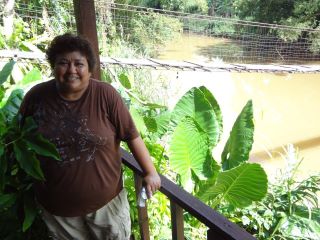 |
| A non RSPO palm oil plantation. Where did the rainforest go? |
The company was founded in 1995 and are smallholders because they rent their land (about 5,000 acres) from the Indonesian government. The company was not aware of RSPO. Panut Hadisiswoyo, founder and current director of the Orangutan Information Center (OIC), explained to us that RSPO is not recognized by the Indonesian Government. Indonesia has their own organization for sustainable palm oil (Indonesian Sustainable Palm Oil, ISPO). Until October of 2011 the ISPO was part of the RSPO, but after criticizing the RSPO for what they call being biased towards environmental groups they decided to sever ties with the RSPO. Read this article about the ISPO leaving the RSPO.
The plantation destroyed about 135 acres of rainfroest in the Gunung Leuser National Park to build their palm oil plantation. To lease their land from the government they utilize GPS's to measure how much land they are using. The Manager added that they use the land and pay taxes on what they had cleared.
This company harvests their palm seeds and sells the seeds to a mill (Gaya Baru).
 |
| A female employee getting ready to apply fertilizer. |
Employees at the plantation are seventy five percent local and others come from surrounding communities. Workers at the plantation make about $130/month and about 67 pounds of rice. In Indonesia rice is included in every meal - breakfast, lunch dinner. The plantation provides houses for the employees and their families. Most employees live in the plantation and their kids go to the local community school in Besitang.
In regards to wildlife and the environment, the manager and employees reported spotting wild elephants about every two months, and one orangutan in 2006. They have been using fencing to prevent elephants from enterring the plantation. Elephants can easily destroy palm trees and cost the farmers money. Human-elephant conflicts can occur as well.
When asked why the company started growing palm oil trees their response was, "to reduce the oil palm demand."
Antonia
















